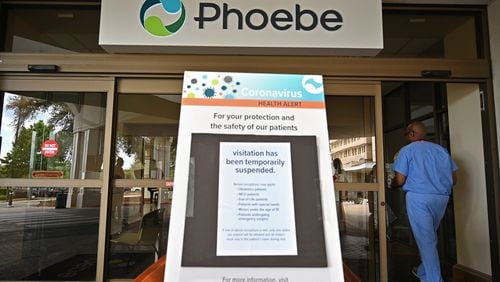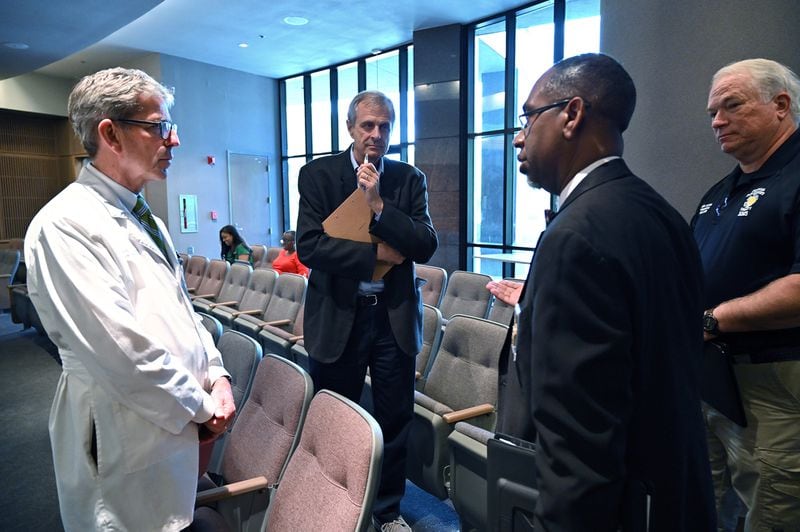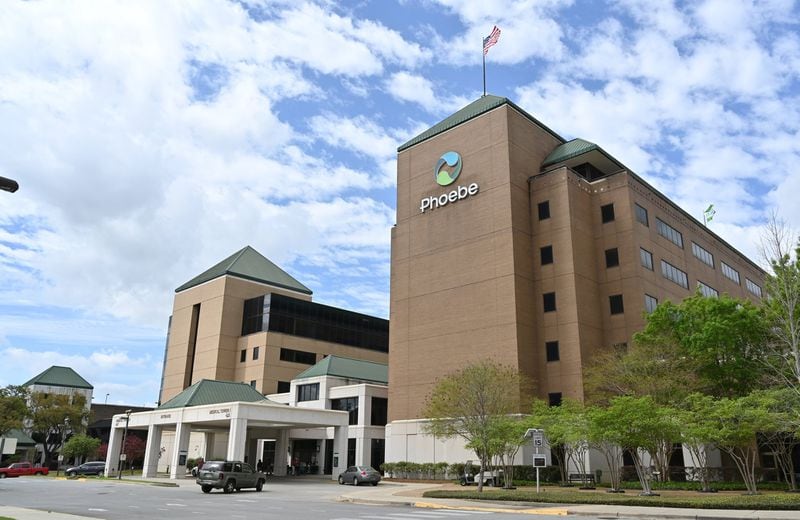Two refrigerated trailers arrived in Albany this week for some grim business: storing the bodies of people who died from the novel coronavirus.
These mobile morgues alleviated “a big problem,” Dougherty County Coroner Michael Fowler said Thursday. “You don’t ever want to stack anyone on top of the other.”
The trailers were among eight that state officials deployed across Georgia — stark indicators that, despite a brief slowing in confirmed coronavirus deaths, the crisis is far from over.
Nearly 11,000 Georgians have tested positive for COVID-19, the disease caused by the coronavirus, and the death toll rose Thursday to 412 — 43 more than on Wednesday.
A month ago, Georgia public health officials had confirmed just 22 cases and no deaths.
With a statewide shelter-at-home order in force through the end of April, the coronavirus outbreak continues not only to sicken thousands, but also to disrupt Georgia’s economy and political system.
Thursday brought news that almost 400,000 Georgians applied for unemployment benefits last week, more than in all of 2019. Also Thursday, state officials again postponed primary elections. Voting that was originally scheduled for March 24 and then for May 19 now is supposed to take place on June 9.
Newly confirmed deaths rose at a slightly slower pace the past two days, following alarming spikes early in the week. But the figures provided by the state Department of Public Health don’t immediately reflect reports the agency receives from coroners, hospitals and other officials around the state.
COMPLETE COVERAGE: CORONAVIRUS IN GEORGIA
NEW PHOTOS: METRO ATLANTA AMID COVID-19
“It takes time to verify data,” said Dr. Kathleen Toomey, the state public health commissioner. “Our data are not real time.”
The agency has been slow to release demographic data about people diagnosed with the virus or those who died.
On Thursday, it said it did not know the race of more than half of those with confirmed cases or nearly one-fourth of those who have died. However, the agency said that among those whose race could be determined, 56 percent were African American.
State officials also have released few details about their projections for the outbreak’s trajectory. Aides to Gov. Brian Kemp said he has relied on scientific models from several sources, including the U.S. Department of Defense, the University of Georgia and one widely cited analysis by the University of Washington’s Institute for Health Metrics and Evaluation. That model now forecasts 2,630 coronavirus-related deaths in Georgia by early June. It had predicted more than 3,200 deaths before statewide social-distancing measures took effect.
Regardless, the establishment of the mobile morgues suggests officials are bracing for the worst.
They are the kind of units normally set up after natural disasters that cause significant loss of life: hurricanes, tornadoes, floods. But the Georgia Emergency Management Agency said Thursday it has placed the units at seemingly placid locations: Grady Memorial and Emory Midtown hospitals in Atlanta, as well as in Douglas County, Athens and at Augusta University Medical Center. Another unit will provide additional storage space for the state medical examiner’s office at the Georgia Bureau of Investigation headquarters in Decatur.
In Albany, a trailer with a capacity of 24 bodies was placed at Phoebe Putney Memorial Hospital, GEMA said. The second unit, sent to the coroner’s office, has a capacity of 48.
Credit: HYOSUB SHIN / AJC
Credit: HYOSUB SHIN / AJC
Most bodies must be stored for several days until laboratory tests confirm COVID-19 as the cause of death, said Fowler, the coroner. Some die before test results come back, others without having been tested at all. Samples may be taken with nasal swabs for at least 72 hours after a death, the state’s chief medical examiner, Dr. Jonathan Eisenstat, told coroners and law enforcement officials in a memorandum last week.
Already, more than five dozen people have died in Dougherty County, more than in any other Georgia county. Dozens more from nearby counties have died at Phoebe Putney, southwest Georgia’s largest health care provider. Critical care units at the hospital have been pushed to their limits.
The hospital was treating 150 patients with confirmed COVID-19 diagnoses on Thursday, the most of any day since the outbreak began, said Scott Steiner, chief executive of Phoebe Putney Health System.
“While we would love to say we have reached our COVID-19 peak in southwest Georgia, that is not something we can say yet with confidence,” Steiner said.
Instead, he said, the hospital continues to plan “for tomorrow, next week and next month.”
Albany has been mostly locked down for several weeks, and strains are beginning to show as police and sheriff’s deputies cite residents who violate shelter-at-home orders.
At a news briefing, streamed on Facebook, Albany Mayor Bo Dorough angrily responded to citizens who have complained the city has become a “police state.”
“Those who continue to follow their own routines and not modify their behavior are selfish, irresponsible and foolish,” Dorough said.
At the same briefing, Chris Cohilas, chairman of the Dougherty County Commission, spoke somberly about the high death toll in a county of fewer than 90,000 people.
“We have lost 60 Dougherty County citizens,” Cohilas said, a mask covering his face to protect against the virus. “That is a staggering number. Sixty souls. Sixty grandmothers, 60 husbands, 60 wives, 60 people who lived, worked, played and prayed in this community.”
By Thursday evening, the number of deaths had climbed to 66.











